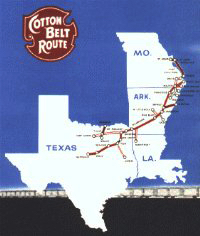Kansas and Gulf Short Line (Lufkin Branch)
In Texas, the company purchased the Kansas and Gulf Short Line Railroad Company, a narrow gauge railroad running between Tyler and Lufkin, a distance of about ninety miles. This little railroad has a very interesting history in itself. When J. P. Douglas relinquished his position as president of the Texas and St. Louis Railway Company in 1880, he immediately organized this company in order to give Tyler a direct outlet to the Gulf. Most of the men who helped him build the Tyler Tap became subscribers to the stock of this new enterprise. Incorporated under the laws of Texas on February 18, 1880, it was given the right to construct a line from Tyler south to Sabine Pass, Texas, on the Gulf of Mexico.
The stockholders met and elected J. P. Douglas, president; W. S. Herndon, vice-president; T. R. Bonner, treasurer; and E. H. Wells, chief engineer. The latter was the man who surveyed the Tyler Tap from Tyler to Mt. Pleasant.

Wells headed a survey party which left Tyler on February 3, 1881, and made preliminary surveys extending from Tyler south through Cherokee county and a portion of Angelina county to a point near the town of Homer. After locating about thirty miles of line to the vicinity of Alto, Texas, construction was started at Jacksonville, south towards Rusk. The reason that they did not start building from Tyler instead of from Jacksonville was that on January 22, 1881, the company acquired the property rights, and franchises of the Rusk Transportation Company from C. C. Francis and others who had purchased the same at foreclosure sale.
This latter company, which had constructed a narrow-gauge tramroad between Rusk and Jacksonville, was incorporated under a special act of the Legislature of Texas approved on May 2, 1874, for the purpose of constructing a first class tram-railroad or horse car road from a point on the International and Great Northern Railroad in Cherokee county to the town of Rusk. Traditionally, the road was constructed by the citizens of Rusk in an effort to keep the courthouse from being moved to the more important shipping center of Jacksonville. This scheme worked, as the hardwood rails provided a smooth surface for the horse-drawn cars and minimized the previous transportation difficulties that existed between the two towns.
In Jacksonville, a twelve-ton locomotive, costing $5,200 and constructed by Bailey and Company of Philadelphia, had arrived with twenty-four freight cars. Utilizing this new equipment, the track between Tyler and Jacksonville was completed in 1882, and by the following year construction had progressed to a Point five miles south of Alto, Texas, making a total length of sixty-one miles.
W. S. Herndon was elected president of the Kansas and Gulf Short Line on May 8, 1883, and remained in that capacity until the St. Louis, Arkansas and Texas Railway took over the property in 1887. Lufkin was finally reached on July 1, 1885. A proposed extension to Rockland failed to materialize due to the change in management. This little road proved to be a money maker after its completion between Tyler and Lufkin. In 1886, the net earnings amounted to $16,067.39, which made Fordyce aware of its value and anxious to absorb it into the expanding St. Louis, Arkansas and Texas system. This property was deeded to St. Louis, Arkansas and Texas Railway Company in Texas on April 29, 1887, but the deed was voided by court order. The property was then deeded to Tyler Southeastern Railway Company on January 13, 1891. The line from Tyler to Lufkin was standard-gauged in 1895.
On May 10, 1899, the Legislature of Texas passed a special law authorizing the St. Louis Southwestern Railway Company of Texas, successor to St. Louis, Arkansas and Texas Railway Company in Texas, to purchase, own and operate the railroad property and franchises of the Tyler Southeastern Railway Company. The stockholders and directors met on October 6, 1899, and practically unanimously voted to accept the terms of the Act. Accordingly, the St. Louis Southwestern acquired the stock and indebtedness, secured and unsecured of every kind, of that company.
